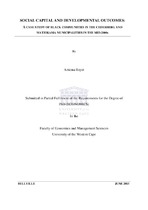| dc.description.abstract | Transforming economic growth into tangible benefits for poor communities appears to have frustrated development practitioners and policy makers. Despite the net positive growth achieved between 1994 and 2014 the face of poverty and inequality remains largely unchanged in South Africa. In such circumstances there is a pressing need for scholars to rethink the social foundations of economic activity and policy (Chang, 2006; Fine, 2001, 2005). One specific line of enquiry that has attracted attention among economists (Stiglitz, 2000; Woolcock, 2001; Fine, 2001) is that of social capital. This thesis seeks understanding of the relationship between social capital and the socioeconomic advancement of poor African/Black residents, particularly those in rural municipalities where there is a lack of financial and other resources. With this in mind, Robert Putnam’s path-breaking theory will be reformulated to explore the relationship during the mid-2000s between social capital, trust, political participation and socioeconomic outcomes in two rural municipalities in the Western Cape province of South Africa, namely Cederberg and Matzikama. The research questions the adequacy of Putnam’s theory of social capital, arguing that it is conceptually simple and inadequate as a description of how membership in social groups (networks) lead to better socioeconomic outcomes in the context of marginal, rural African/Black communities residing in under-capacitated municipalities. The thesis argues that an alternative conceptual framework is required, capable of depicting the complexity of the social processes required to translate social group membership into tangible benefits for poor households, as an explanation of why African/Blacks in Cederberg experienced better socioeconomic outcomes than their counterparts in Matzikama. | en_US |

